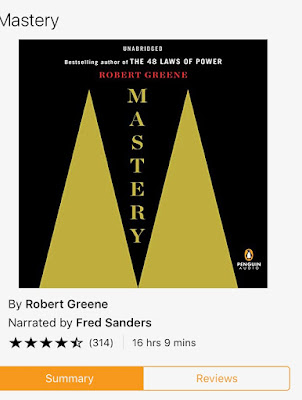Book review: Mastery by Robert Greene
I've been going through my library of audio books on Audible to make productive us of my time whilst waiting to start my new job.
Apart from The Barefoot Investor that I am fond of listening to when going on car drives, this is among other audio books that have bought in 2018 from Amazon Audible.
Apart from The Barefoot Investor that I am fond of listening to when going on car drives, this is among other audio books that have bought in 2018 from Amazon Audible.
The recording:
Now, this is one of the books that I recommend you should get. Depending on where you got it from (there is the Kindle, and the Audible version). I bought the Audible version. Both are available from Amazon Australia.
The Mastery audio book version has a 16 hour recording. It's not the kind of book that you could listen to in one reading, as there are many parts the reader needs to digest in parts over many readings. But it is worth it.
Let me recount the reasons why I think you should get it (and The Barefoot Investor, of course.. LOL)
The Mastery audio book version has a 16 hour recording. It's not the kind of book that you could listen to in one reading, as there are many parts the reader needs to digest in parts over many readings. But it is worth it.
Let me recount the reasons why I think you should get it (and The Barefoot Investor, of course.. LOL)
I chose to order the audio version of the book as it was something I could listen whilst going about my work or driving. I also enjoy the narrator's reading. His voice is pleasant to listen to, without inducing sleep, well paced, emphasising on areas which he knows the reader needs to pay attention to.
The content:
Mastery is as the title states 'mastery', of the human mind, their career path, and their endeavours.
Having also read a previous book in 2005 by Robert Greene, the 48 Laws of Power, I have come to expect his story telling style of using well known history figures in order for him to illustrate his point. The 48 Laws of Power was a bit hard core reading, so it didn't really caught on with me.
Each chapter takes roughly about an hour to listen to, and with 16 chapters to go through, you'd be spending an immense lot of time digesting what the author has to say in the material. Mastery is a much a easier read, with its points more digestible and succint. If you are a person who is looking for more reason and practical strategies for you to master your craft, this book is a better read.
What I really enjoyed listening to Mastery was it brings to point that mastering your craft, or trade of your choice is still relevant now as it was 500 years ago.
What and who we have come to know as "geniuses" in their field of work did not come by accident. They put in many hours of study, hardwork, and persisted. It was not by luck or by chance, but they went through intense years of study in the apprenticeship phase before going out to strike out on their own.
It also brought home the point, and for me, that if I want to be successful in the field of work, or craft that I want to excel in, I have to put in equally just as many hours of study in order to master it. Mastery is not a "touch and go", and what we have in this day and time are just tools that helps us to practise and master our skills in the different areas in order to excel.
There is no such thing as luck, and circumstances that can hold us back. One of the compelling examples that Greene uses is Leonardo Da Vinci. Born out of wedlock in 1452, his illegitimate standing prevented him from being able to receive proper formal education, and being able to attend university.
Yet, this did not stop him from pursuing his dreams and his ambitions. Without the education to pursue formal education in reading, writing and arithmetic, his future prospects for what they would have deemed a proper lucrative profession would be bleak.
This somehow was a blessing in disguise. Having the freedom to roam as he pleased as a young child (being illegitimate and all, they probably didn't pay much attention to him), he stole drawing paper from this father's office (his father was a notary who kept expensive rolls of paper in his office) to sketch objects and animals as he wanted. At the age of 14, he started what is to be his formal apprenticeship as an artist in Florence.
Da Vinci always danced to his own tune. He never let his background prevent him from having his own dreams. One of the things that Da Vinci hated was the dependence forced upon artists to gain royal favour, to live on commission. He established a new strategy for his own livelihood, and be more than an artist, and pursued all the crafts that he needed to support himself.
Just like Da Vinci, we need to know our own strengths, our weaknesses. Seeking our own path, with as much perseverance and persistence as we possibly can. Regardless of background or circumstances, it is a matter of mind over matter.





Comments